

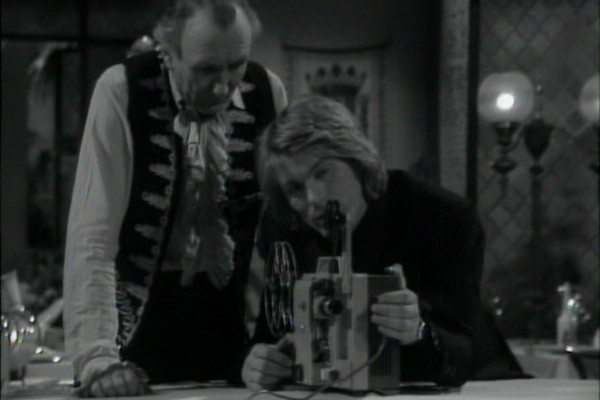
"Why don't you just leave me alone? Why don't you just leave me alone?"
"Gorblimey, who's she think she is, Greta Garbo?"
A witty take on the 1932 Garbo movie Grand Hotel, this episode places Budgie into the world of a one star lodging, populated by the various comings and goings of businessmen and hotel staff. The first series of Budgie was far more experimental in form than the second, and this one creates such vivid supporting characters that the star of the show is on screen for less than twenty minutes.
Although the entire episode is pretty much stolen by Iain Cuthbertson (his pronounciation of "tomato juice" a particular delight), there's a great number of events on screen, as characters drift in and out of the narrative, culminating in guest star Peter Sallis learning of his daughter's suicide while no real sympathy is given. Like a lot of Budgie episodes, there's a cold, bleak heart at the centre of it, an involved storyline that rewards repeat viewings and should possibly be higher in this ranking.

Brains sees the first appearance of Budgie's wife Jean, played by Georgina Hale. Although the character returns for the first two episodes of series two, this is her sole series one outing, a mentally fragile woman who is psychologically and physically abused by Budgie. For her part, as the episode begins, she's having an affair with a manager at her workplace, in full knowledge that he has a wife and children.
This is the questionable appeal of Budgie today, in that it's so unlike almost anything on modern British television, expecting the viewer to cheer for people who have almost no moral scruples at all. The old adage that "good people can do bad things" is writ large throughout the programme, yet it's hard not to sympathise with Budgie's wife at the climax, where life has driven her to the point of a breakdown. Budgie attempts to do something right by her for a change, but his plans come undone... the first of the show's customary downbeat conclusions.
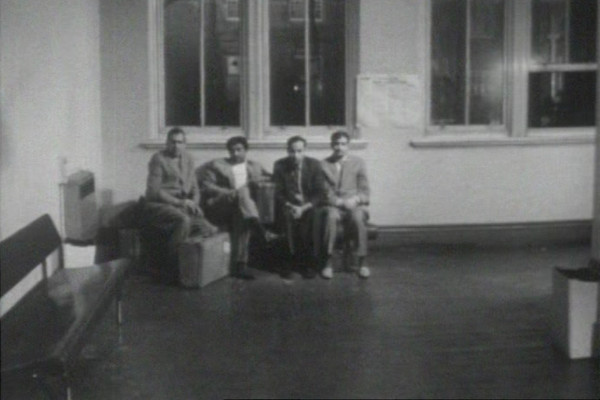
Some Mothers' Sons contains a whole surfeit of dialogue that would never be aired today, as Faith's Budgie routinely blasts, without satirical intent, the "wogs" that he's requested to look after this episode. Yet there's much to commend here, from Charlie Endell's Machavellian scheming to land Budgie with the lease to a brothel, down to the creditable way the four Pakistanis are presented on screen. Although Budgie denigrates them throughout, they're not broad caricatures (as Albert Moses would later play in Mind Your Language), but authentic characters who actually speak in Urdu during the episode.
The final few minutes of this second episode perfectly showcase both the weaknesses and strengths of Budgie as a series: a scene with all four illegal immigrants waking up is painfully slow, even for the standards of the time, Budgie often feeling dated even for 1971; yet a final scene with them all being led away in long shot to the tune of The Big Rock Candy Mountain is a show with genuine artistic intent.
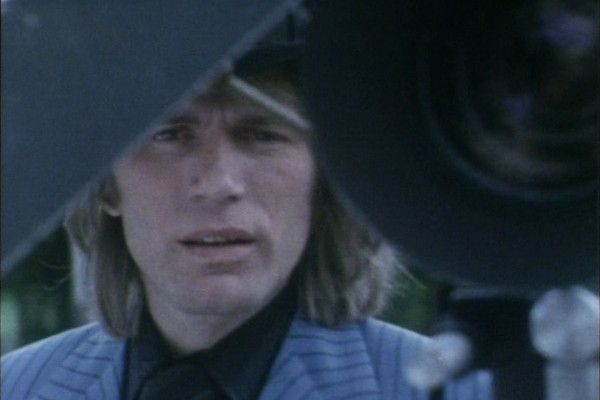
Another instalment that takes inspiration from Hollywood's golden years, this penultimate episode is drawn from 1962's Whatever Happened To Baby Jane? and 1950's Sunset Blvd. The latter, in particular, is the main inspiration here, with plot twists and situations coming direct from the Wilder movie, albeit placed through a typically Budgiesque filter. In fact, whereas Grandee Hotel can be appreciated more when you know what it's homaging, Sunset Mansions is an episode that is perhaps best viewed in isolation, as the debts it owes its source are so strong it can detract from what is an otherwise fine episode.
With series two of Budgie, the programme sadly got less experimental and saw the character occupying a similar world each week. Series one sees them trying new things, and here has him accidentally backing into the world of an eccentric, washed-up actress, and her son, a Welsh homosexual played against type by John Thaw. It's an engrossing set up with a suitably downbeat resolution, though the episode is also notable for the relationship between Budgie and Charlie Endell entering a new phase.
Although he had threatened Budgie in the past, this is the first time where Charlie actually hits him, an action that takes Budgie by surprise. A striking development here, this does sadly go on to undermine their relationship and the credulity of the programme as a whole when it returned the following year. What had been an association based on the pretence of mutual respect suddenly evaporated into Budgie being openly mistreated and physically bullied by Charlie as a matter of course, causing the viewer to wonder why they didn't simply part company. However, such developments are not the fault of Sunset Mansions, an engaging piece; merely a note that the ultimate downfall of the series began here.
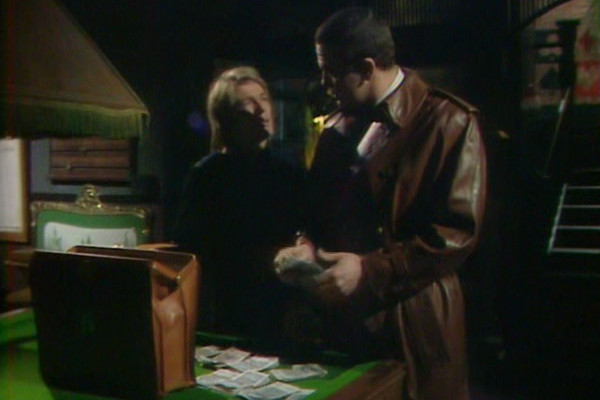
Almost my choice for the best episode of series one, In Deep starts with Budgie coming into good fortune and continually sabotaging his own fate, including being ripped off by obvious pool sharks. It's this element of the series that gives Budgie such a limited lifespan beyond this excellent first series; if the lead character is so relentlessly stupid, then his opportunities to carry on living such a lifestyle would naturally become limited. A continuation of the series where Charlie continues to employ him, or Budgie is able to feed himself despite never succeeding, stretches credulity the longer it continues. Speaking of Charlie, we learn here that even he has people to fear, openly admitting that he's paid protection money to a rival gangster, and uses Budgie as a pawn to trap said gangster, seemingly little caring if Budgie is hurt in the process.
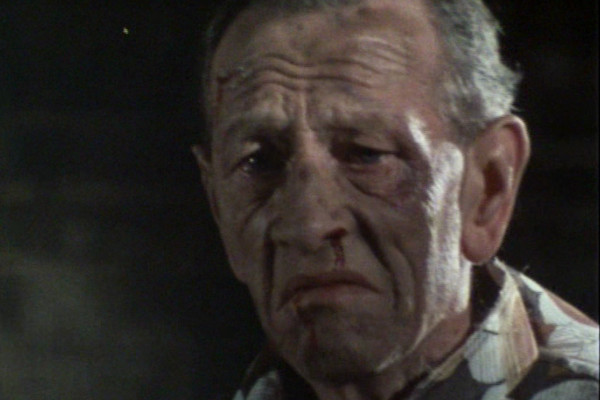
The first episode to be directed by Mike Newell, the man later behind such films as Donnie Brasco, Harry Potter and the Goblet of Fire and Four Weddings and a Funeral. Altogether six separate directors worked on Budgie, with just three of them - Newell, Jim Goddard and Michael Lindsay-Hogg - working on this first series. Newell brings some nice touches to his work here, even adopting what appears to be hand-held cameras for some sequences.
On the writing side, then another curious element of the programme is the shaky inter-episode continuity. Here Charlie Endell insists he knows that Budgie would never steal from him... just the following episode after Budgie did steal from him (Could Do Better). Along similar lines is Charlie talking about his reputation and standing, and how it must be seen to be upheld... just two episodes after he's openly admitted to people, even Budgie, that he's paid protection money during In Deep. Such things can be explained away, but it's a curious element in a series that veers from tragedy to farce from week to week, and a seeming casualty of Willis and Hall's working arrangement.
As for the story itself, then it's a perfect showcase of how a strong ending can elevate even the most mediocre episodes of the programme. While fairly realistically coded, the majority of the story is a light-hearted, comic tale, with Joe Gladwin from Last of the Summer Wine as the best mate of the title. Although some of the content may be shocking today (Budgie's solution to his friend's claim that his wife has gone to live with Muslims is "get her away from the blackies, give her a good hiding") it's all generally fluffy fare, there to promote laughs rather than any real drama.
What makes it possibly the best Budgie episode of all is the way it wrongfoots the viewer, its remaining moments seeing Charlie Endell psychologically torturing Budgie as he offers him a chance to save his friend, then arranges his beating regardless. It's a bleak, repellent and sadistic conclusion, a lightweight episode booted up in the air into excellence.